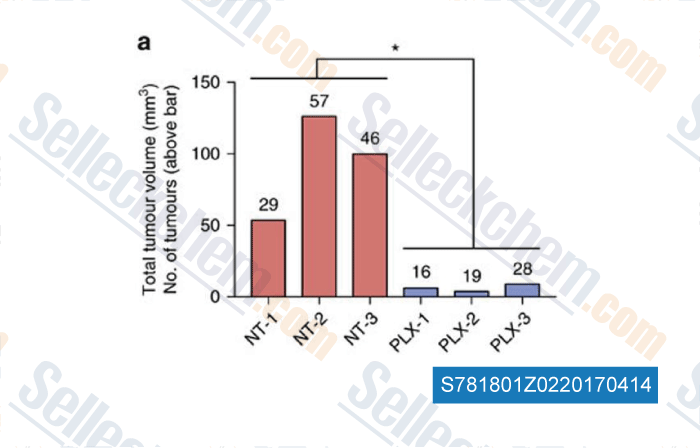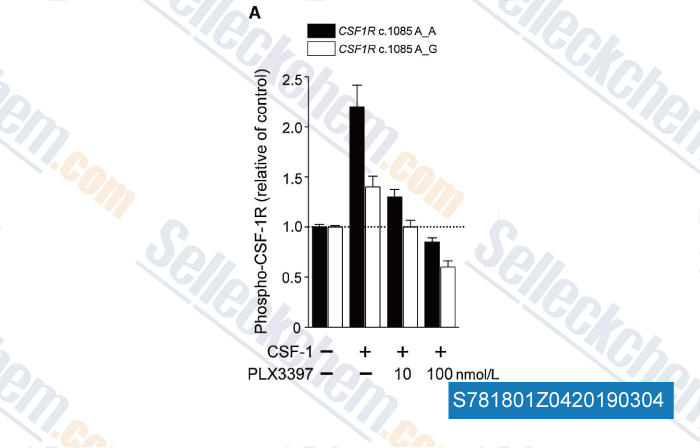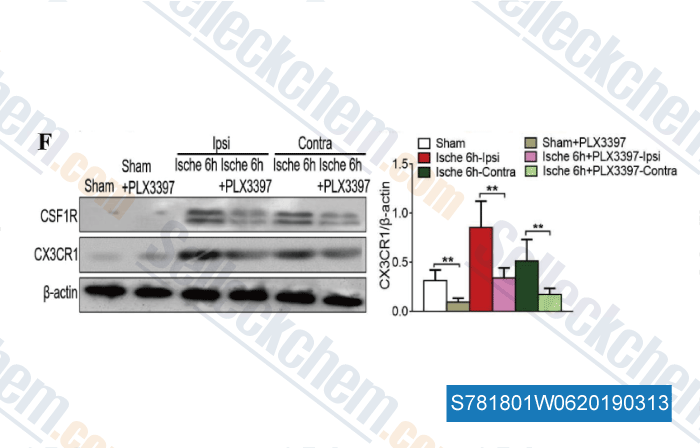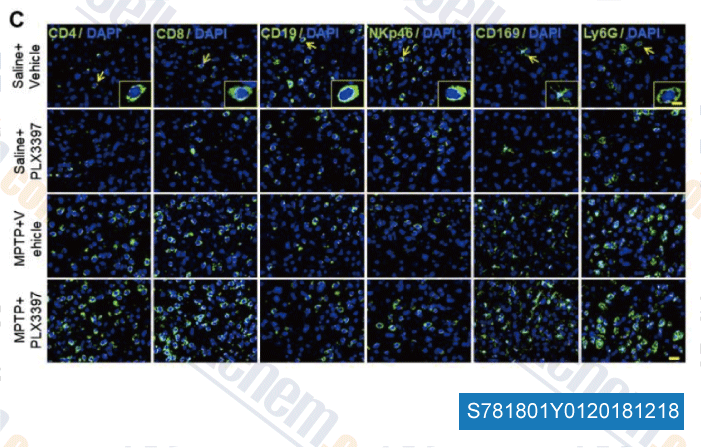|
Toll Free: (877) 796-6397 -- USA and Canada only -- |
Fax: +1-832-582-8590 Orders: +1-832-582-8158 |
Tech Support: +1-832-582-8158 Ext:3 Please provide your Order Number in the email. |
Technical Data
| Formula | C20H15ClF3N5 |
|||
| Molecular Weight | 417.81 | CAS No. | 1029044-16-3 | |
| Solubility (25°C)* | In vitro | DMSO | 84 mg/mL (201.04 mM) | |
| Water | Insoluble | |||
| Ethanol | Insoluble | |||
|
* <1 mg/ml means slightly soluble or insoluble. * Please note that Selleck tests the solubility of all compounds in-house, and the actual solubility may differ slightly from published values. This is normal and is due to slight batch-to-batch variations. * Room temperature shipping (Stability testing shows this product can be shipped without any cooling measures.) |
||||
Preparing Stock Solutions
Biological Activity
| Description | Pexidartinib (PLX3397) is an oral, potent multi-targeted receptor tyrosine kinase inhibitor of CSF-1R, Kit (c-Kit), and FLT3 with IC50 of 20 nM, 10 nM and 160 nM, respectively. Pexidartinib (PLX3397) induces apoptosis and necrosis with antitumor activity. Phase 3. | ||||||
|---|---|---|---|---|---|---|---|
| Targets |
|
||||||
| In vitro | In M-NFS-60, Bac1.2F5 and M-07e cells, Pexidartinib inhibits the CSF1-dependent proliferation with IC50 of 0.44 μM, 0.22 μMand 0.1 μM, respectively. [1] |
||||||
| In vivo | In MMTV-PyMT mice, Pexidartinib (40 mg/kg, p.o.) significantly inhibits both steady-state and PTX-induced tumor infiltration by CD45+CD11b+Ly6C−Ly6G−F4/80+. Pexidartinib/PTX therapy also results in a significant reduction in CD31+ vessel density within mammary tumors, paralleling induction of apoptosis and necrosis. [1] In C57 mice bearing GL261 tumors, Pexidartinib (p.o.) inhibits glioblastoma invasion. [2] In cmo mice, PLX3397 significantly attenuates autoinflammatory disease by decreasing the erosive bone lesions in tails and paws and the levels of circulating MIP-1α. [3] In mice bearing B16F10 melanomas, Pexidartinib (45 mg/kg, p.o.) enhances CD8-mediated immunotherapy of melanoma. [4] |
Protocol (from reference)
| Kinase Assay: |
|
|---|---|
| Animal Study: |
|
References
Customer Product Validation

-
Data from [Data independently produced by , , Nat Commun, 2017, 8:14293]

-
Data from [Data independently produced by , , Clin Cancer Res, 2017, 23(20):6021-6030]

-
Data from [Data independently produced by , , Brain Behav Immun, 2018, 68:248-260]

-
Data from [Data independently produced by , , FASEB J, 2018, 32(6):3336-3345]
Selleck's Pexidartinib (PLX3397) has been cited by 108 publications
| The aging mouse CNS is protected by an autophagy-dependent microglia population promoted by IL-34 [ Nat Commun, 2024, 15(1):383] | PubMed: 38195627 |
| Host-functionalization of macrin nanoparticles to enable drug loading and control tumor-associated macrophage phenotype [ Front Immunol, 2024, 15:1331480] | PubMed: 38545103 |
| Microglia-endothelial cross-talk regulates diabetes-induced retinal vascular dysfunction through remodeling inflammatory microenvironment [ iScience, 2024, 27(3):109145] | PubMed: 38414848 |
| Colony stimulating factor-1 (CSF-1) signalling is predictive of response to immune checkpoint inhibitors in advanced non-small cell lung cancer [ Lung Cancer, 2024, 188:107447] | PubMed: 38176297 |
| Myc Dysregulation in Activated Macrophages Initiates Iron-Mediated Lipid Peroxidation that Fuels Type I Interferon and Compromises TB Resistance [ bioRxiv, 2024, 2024.03.05.583602] | PubMed: 38496444 |
| Engineering an inhibitor-resistant human CSF1R variant for microglia replacement [ J Exp Med, 2023, 220(3)e20220857] | PubMed: 36584406 |
| Polyoxazoline-Based Nanovaccine Synergizes with Tumor-Associated Macrophage Targeting and Anti-PD-1 Immunotherapy against Solid Tumors [ Adv Sci (Weinh), 2023, 10(25):e2300299] | PubMed: 37434063 |
| The type-I interferon response potentiates seeded tau aggregation and exacerbates tau pathology [ Alzheimers Dement, 2023, 10.1002/alz.13493] | PubMed: 37849026 |
| Repopulated retinal microglia promote Müller glia reprogramming and preserve visual function in retinal degenerative mice [ Theranostics, 2023, 13(5):1698-1715] | PubMed: 37056562 |
| Meningeal macrophages inhibit chemokine signaling in pre-tumor cells to suppress mouse medulloblastoma initiation [ Dev Cell, 2023, 10.1038/s41418-023-01234-w] | PubMed: 37774709 |
RETURN POLICY
Selleck Chemical’s Unconditional Return Policy ensures a smooth online shopping experience for our customers. If you are in any way unsatisfied with your purchase, you may return any item(s) within 7 days of receiving it. In the event of product quality issues, either protocol related or product related problems, you may return any item(s) within 365 days from the original purchase date. Please follow the instructions below when returning products.
SHIPPING AND STORAGE
Selleck products are transported at room temperature. If you receive the product at room temperature, please rest assured, the Selleck Quality Inspection Department has conducted experiments to verify that the normal temperature placement of one month will not affect the biological activity of powder products. After collecting, please store the product according to the requirements described in the datasheet. Most Selleck products are stable under the recommended conditions.
NOT FOR HUMAN, VETERINARY DIAGNOSTIC OR THERAPEUTIC USE.
